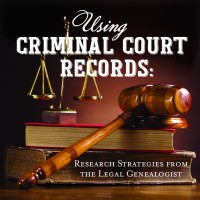Criminal court records
From America’s first convicted murderer — a Mayflower passenger — to the 20th century gangsters and organized crime, criminal court records have documented a slice of American life that offers more pizzazz and bang for the buck than virtually any other type of record in our genealogical world.
 And there aren’t any records around that are as much fun — and it doesn’t really matter whether you have an ancestor who’s the suspected villain (like my second great grandfather, indicted once for bigamy and once for murder, and he beat the rap, both times), or one who’s playing a supporting role — like judge or juror, arresting officer or witness.
And there aren’t any records around that are as much fun — and it doesn’t really matter whether you have an ancestor who’s the suspected villain (like my second great grandfather, indicted once for bigamy and once for murder, and he beat the rap, both times), or one who’s playing a supporting role — like judge or juror, arresting officer or witness.
And two weeks from today, Family Tree University is hosting The Legal Genealogist in a one-hour webinar presentation: Using Criminal Court Records — Research Strategies from The Legal Genealogist.
I can’t wait.
It’s on for Tuesday, the 11th of December, at 7 pm EST / 6 pm CST / 5 pm MST / 4 pm PST, and like all of the Family Tree University webinars, advance registration is required. The early bird price is $39.99 until December 4th, and $49.99 thereafter, and we’re going to cover the highlights of the whole criminal system from the first court records created after a crime — the criminal complaint, arrest warrant and indictment — all the way through to the kinds of records created by the prison systems.
We’ll take a look at records created at every level of government — from the cities and counties to the states to the federal government — and even some records from places like England and Canada and Australia. And we’ll look at all kinds of crimes and the punishments our ancestors faced if convicted, from the stocks and whipping posts of colonial times to the penitentiaries of more recent times.
And we’ll talk about ways to find the records that relate to our ancestors in the many roles they played in the criminal justice system and what those records tell us about the times in which our ancestors lived.
Come on out and join me, December 11th, for Using Criminal Court Records — Research Strategies from The Legal Genealogist.



I’m pretty excited about this. Heading over to register. Still having trouble tracking down info on my ancestor who was tried (and probably convicted) for coining his own money during the civil war. If anybody can teach me over this hurdle Judy, it will be you.
I sure hope I can help, Rory!
I’d love to see you write a book on this topic, Judy! When I saw the image with this blogpost I thought it was a book cover.
Yes, please, Judy. How about a book? And not just on criminal cases, either. How about ALL court cases (you could do a boxed set!).
Maybe after I retire. Assuming the economy improves enough that I ever can retire!
Right now, when I look at my schedule and the “abundant spare time” built into it, the idea of even contemplating a book project fills me with dread. Working for a living definitely interferes with what I want to do…
Really looking forward to this webinar, Judy. I’m hoping it will help me dig up more records on the ne’er-do-wells in the family, of whom there seem to be a significant number.
I’ll be happy to “see” you online for this, Barbara!
Looks great, Judy! However, I may not be available at that time. Do you know whether the CD will be for sale later? If so, what will it cost? Thanks!
I’m told there are two options, Liesa. Sign up for the webinar anyway so that you can submit any questions you have for the Q&A, and then wait for the email to be delivered that contains a recording of the webinar, PDF of the slides and the additional handout (which is delivered two days after the presentation)
Or you could wait for the webinar to be turned into an OnDemand video in FTU’s ShopFamilyTree.com store, which usually takes about two weeks after the live event.
Okay, great…thanks Judy!
Thanks for your interest!